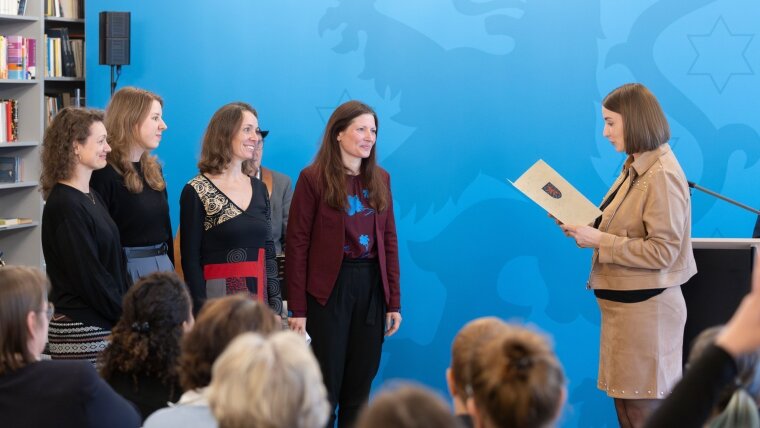
- Awards and Personnel
Published: | By: Ute Schönfelder
The Thuringian Minister of Social Affairs, Katharina Schenk, presented this year’s Thuringian Animal Welfare Awards last week. Seven individuals and teams received awards, including researchers from the University of Jena and the Jena University Hospital (JUH), who were honoured in the category »Development of suitable alternative methods to animal testing«.
Mild to moderate neurodermatitis
The award recognizes the efforts of Dr Maria Witt-Wallert and her team from the Institute of Nutritional Sciences to establish a skin model that, among other things, enables the testing of new, natural substance-based active ingredients for the treatment of atopic dermatitis (neurodermatitis)—with the aim of promoting research approaches that cause less animal suffering. In addition to Dr Witt-Wallert, the award-winning team includes Dr Rebecca Riedl, Dr Betty Hebecker, Anja Geisler, Yvonne Hupfer and Dr Lisa Börmel.
»Conventional animal models are often based on severe disease progression in order to prove the efficacy of potential active substances. However, this is associated with a high level of stress for the animals«, explains Dr Maria Witt-Wallert, head of the research project. The model developed by the Jena researchers only triggers mild to moderate symptoms, thereby reducing the burden of disease on the animals. »This makes it possible to significantly reduce animal suffering—while maintaining scientific validity«, Witt-Wallert continues. In addition, the model with mild to moderate disease severity more accurately reflects clinical reality, as the majority of people affected by the disease suffer from milder forms.
3R principle: Replace, Reduce, Refine
In their award-winning project, the researchers at the University of Jena are working according to the international »3R principle«. The 3 Rs stand for Replace, Reduce, Refine. The aim of this approach is to reduce the number of animal experiments and keep the suffering of laboratory animals to a minimum. Specifically, the Jena team focuses on refinement—improving existing models—in order to minimize the number of animal experiments required.
Background
The Thuringian Animal Welfare Award recognizes projects, businesses and individuals who have made outstanding contributions to charitable animal welfare, the agricultural husbandry of livestock and the development of suitable alternative methods to animal testing. In 2025, a total of 14 proposals were submitted to the Thuringian Ministry of Social Affairs and discussed by the Thuringian Animal Welfare Advisory Board. The Thuringian Animal Welfare Prize in the category »Development of alternative methods to animal testing« is awarded every two years. The prize is endowed with a total of 6,000 euros.
The work was carried out in the Biochemistry and Physiology of Nutrition research group, headed by Prof. Dr Stefan Lorkowski, and was funded by the Free State of Thuringia with funds from the European Social Fund Plus (2019 FGR 0095).
Contact:
07743 Jena Google Maps site planExternal link